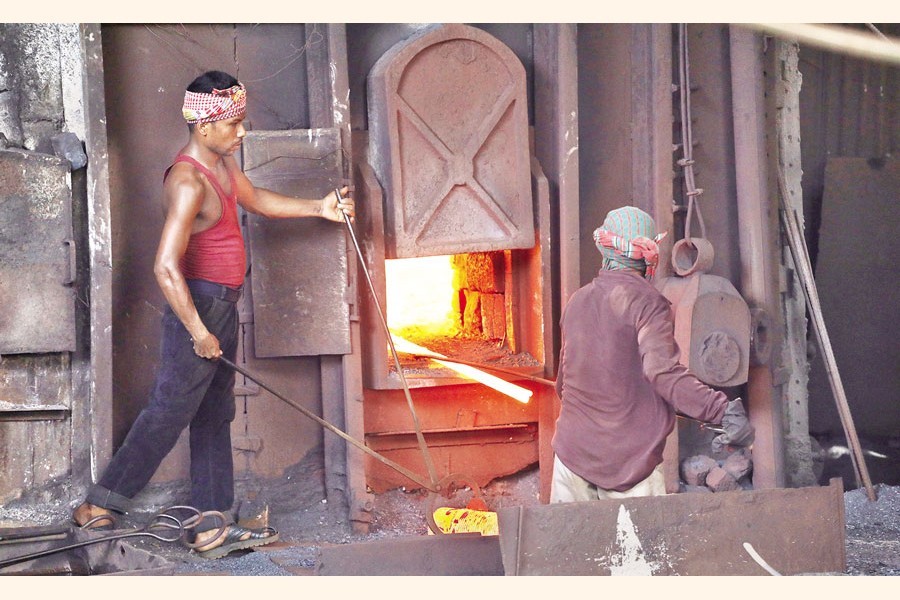Effective coordination among multiple agencies that share responsibilities for occupational safety and health (OSH) in industries is a must to avoid overlapping, negative impacts caused by different approaches, and lack of enforcement and collaboration with private sector - to ensure safe and decent workplace, experts said.
A number of government ministries including industries, labour and employment, home affairs, and housing and public works along with their different departments share multiple responsibilities, like boiler safety, chemical handling, fire prevention, fire-fighting emergency plans, building structural integrity, labour inspections and industrial safety.
As a result, there are overlapping responsibilities, while different approaches impact negatively on safety and cause lack of enforcement, they added.
Industry people at the event also focused on formulation of industrial safety framework to coordinate the multiple interventions including national OSH policies, enforcement of building codes, compliance with labour act, safe and healthy work practices, risk assessments and awareness raising, and training and research of all relevant entities for development of a safe environment for all working in the industries.
They made the observations at a day-long event titled 'Industrial Safety Forum' at a city hotel on Thursday. It was jointly organised by the Centre for Policy Dialogue (CPD) and the International Labour Organisation (ILO).
Industries Minister Nurul Majid Mahmud Humayun was the chief guest, while Labour Secretary Ehsan-E-Elahi was the special guest at the event, moderated by ILO Bangladesh Country Director Tuomo Poutiainen.
"In recent times, safety concerns have increased due to one after another industrial accidents," CPD Research Director Dr Khondaker Golam Moazzem said.
There are a number of agencies that are working on industrial safety, and there are duplications, while few measures are missing, he said, suggesting coordination among all the agencies for sustainability.
Mr Moazzem recommended raising awareness among the workers about the ongoing safety measures, as the workers do not know which agency is taking what safety programmes.
He also called for developing corporate safety culture in all industrial units, saying one of their surveys revealed that safety situation in the large factories is good, while the small units lag behind.
The ILO country director said it is the best time to establish a true safety culture, as works have been going on for decades in this connection.
Better governance and overseeing are important to ensure safety and decent workplace.
He also focused on collaboration among the government agencies, factory owners, workers, and civil society to ensure safety.
The labour secretary said they are very much concerned over ensuring safety and workers' rights in non-RMG (ready-made garment) units and informal sectors.
Terming safety, productivity and quality three pillars for industrial development, he also said safety improves productivity and quality.
He informed that the government has amended 139 provisions of the labour rules, and these would be published as gazette within one or two weeks.
The required amendments to the labour law would also be made by December, he noted.
Bangladesh Employers' Federation President Ardashir Kabir said safety is vital in the context of Bangladesh's next economic development.
Terming OHS important for making the industries sustainable, he suggested safety guidelines and training on safety systems.
Chairman of National Coordination Committee for Workers Education Shamim Ara said there are improvements in the RMG sector after Rana Plaza accident. But there are little improvements in informal sectors that accommodate 87 per cent of the country's total workforce.
She alleged that factory owners' negligence, weakness of monitoring agencies, and absence of trade unions are responsible for industrial accidents.
"We don't want compensation after any accident, rather we want safe workplaces," she added.
There were two separate sessions on the role of public institutions in developing industrial safety framework, and the role of employers in implementing OSH regulations in the industries.
Industry leaders from the FBCCI, RMG and light engineering sectors as well as labour leaders spoke there.
The organisers said industrial safety in Bangladesh is still in nascent stage of development. Its overall framework and institutional preparedness, particularly related to building safety and OSH and environmental concerns remain outside the core activities in most industrial sectors.
In this case, the RMG sector has set a good example by upgrading its standards and practices. Safety progress in the RMG sector and the need for all industrial sectors to follow the suite underscore the necessity to develop a comprehensive framework of industrial safety, they added.


